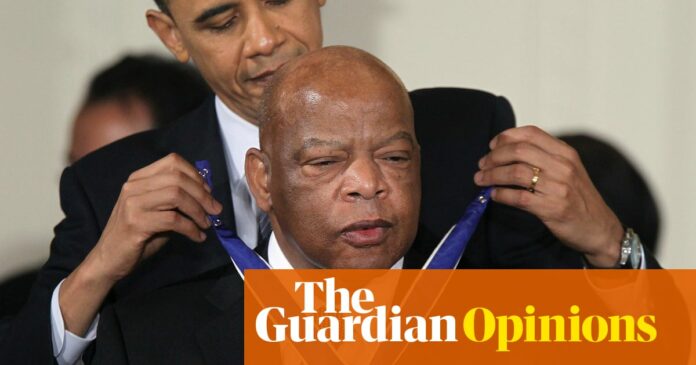The death of John Lewis, the Alabama-born civil rights activist, Freedom Rider and student leader turned Georgia congressman, represents a generational transition in America’s long struggle for Black freedom, dignity and citizenship. A disciple of Dr Martin Luther King Jr who experienced brutal and repeated acts of violence by racist white law enforcement and vigilantes that left him with permanent physical scars, including a cracked skull, Lewis remained stubbornly resolute in his insistence that Black life mattered.
As a student organizer, Lewis braved repeated arrests, jail stints and death threats during protests to end the Jim Crow system of racial segregation that maintained a stranglehold on American democracy. His lifelong quest to create what he later characterized as “good trouble” made him a quintessential figure of the times, one whose authentic love of poor, unlettered peoples was rooted in his own humble origins that began in a shotgun shack in 1940, just outside Troy, Alabama.
Lewis’s preternaturally calm demeanor, southern drawl and genuine humility lulled opponents and even friends into underestimating him. In truth, he contained multitudes, a complexity that reflects the richness of the movement and era that shaped him.
As chairman of the Student Nonviolent Coordinating Committee (SNCC), Lewis matched a personal and tactical commitment to nonviolence with a passion for ending a caste system rooted in racial slavery, segregation, poverty and violence. His youthful militancy was on full display at the March on Washington in 1963, where he vowed to help lead a relentless pursuit of racial justice and citizenship:
“We must say, ‘Wake up America. Wake up!!!’ For we cannot stop, and we will not be patient.”
By 1966, Black impatience within SNCC triggered Lewis’ ouster from the group in favor of Stokely Carmichael, a friend turned rival who would help to popularize the term “Black Power!”
Lewis’s brand of quiet indignation appeared out of step with a revolutionary age, but he remained committed to the new political possibilities opened up by the combined might of civil rights legislation and Black Power’s consciousness raising.
Two decades after being replaced as SNCC chairman, Lewis won an upset victory over his one-time colleague Julian Bond to become a member of Congress. Over the next 30 years Lewis proved to be a resolute legislator who, more often than not, sided with underdogs of all stripes and maintained an uncompromising champion of racial justice.
After backing Hillary Clinton in the 2008 Democratic presidential primaries he switched sides, taking a gamble on a young senator from Illinois who identified as part of the “Joshua Generation” made possible by the activism of King and Lewis.
Barack Obama’s election helped ensure Lewis’s national veneration since he, in contrast to Jesse Jackson, became the first Black president’s favorite living civil rights icon. But the growing national recognition of Lewis as the “conscience of the Congress” at times obscured the halting nature of American racial progress.
Lewis did indeed stand tall at Selma as blows rained down, and in doing so bore witness to the depth and breadth of white supremacist violence against peaceful demonstrators. In the age of Obama, Lewis’s heroism became part of a triumphant national narrative about the civil rights movement that extolled the sacrifice of veterans of the 1960s who enabled contemporary freedoms, including the astonishing elections of Obama in 2008 and 2012.
But as the galvanic national and global protests in the wake of George Floyd’s murder have revealed, levels of Black equality presumed to have been won during the movement’s heroic age have proven largely illusory. As has the seeming permanence of watershed legislation such as the Voting Rights Act, which has been largely curtailed by a 2013 supreme court decision, Shelby v Holder, that undermines democracy by sanctioning widespread voter suppression tactics.
The Black Lives Matter movement cast an important spotlight on the importance of Lewis’s extraordinary and lifelong commitment to ending systemic racism and defeating white supremacy. Lewis, at an early age, recognized the Black freedom struggle as a marathon and not a sprint. On this score he met and admired Malcolm X even as he retained an unswerving commitment to non-violent civil disobedience. Lewis retained a special love for King but embraced the recent BLM protests that have rocked the world as a long overdue reckoning that might complete the struggle for dignity and citizenship that he waged his entire life.
Lewis’s most important legacy, then, surpasses both the real and imagined triumphs that resulted in his election to Congress, friendship with Obama, presidential medal of freedom and widespread admiration from supporters and even former adversaries that he claimed over the course of his life and political career. His most important legacy resides in his service-oriented political leadership, unapologetic struggle for Black dignity and citizenship, and embrace of a younger and combative generation of activists who reminded him and the nation of the still unfinished business of achieving racial justice in America and around the world.
-
Peniel E Joseph is the founding director of the Center for the Study of Race and Democracy at the LBJ School of Public Affairs and professor of history at the University of Texas at Austin. His latest book is The Sword and the Shield: The Revolutionary Lives of Malcolm X and Martin Luther King Jr
